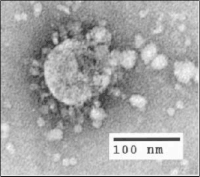
Photo from wikipedia
The route of administration of a therapeutic agent has a substantial impact on its success. Therapeutic antibodies are usually administered systemically, either directly by intravenous route, or indirectly by intramuscular… Click to show full abstract
The route of administration of a therapeutic agent has a substantial impact on its success. Therapeutic antibodies are usually administered systemically, either directly by intravenous route, or indirectly by intramuscular or subcutaneous injection. However, treatment of diseases contained within a specific tissue necessitates a better alternate route of administration for targeting localised infections. Inhalation is a promising non-invasive strategy for antibody delivery to treat respiratory maladies because it provides higher concentrations of antibody in the respiratory airways overcoming the constraints of entry through systemic circulation and uncertainity in the amount reaching the target tissue. The nasal drug delivery route is one of the extensively researched modes of administration, and nasal sprays for molecular drugs are deemed successful and are presently commercially marketed. This review highlights the current state and future prospects of inhaled therapies, with an emphasis on the use of monoclonal antibodies for the treatment of respiratory infections, as well as an overview of their importance, practical challenges, and clinical trial outcomes. Key points • Immunologic strategies for preventing mucosal transmission of respiratory pathogens. • Mucosal-mediated immunoprophylaxis could play a major role in COVID-19 prevention. • Applications of monoclonal antibodies in passive immunisation.
Journal Title: Applied Microbiology and Biotechnology
Year Published: 2021
Link to full text (if available)
Share on Social Media: Sign Up to like & get
recommendations!